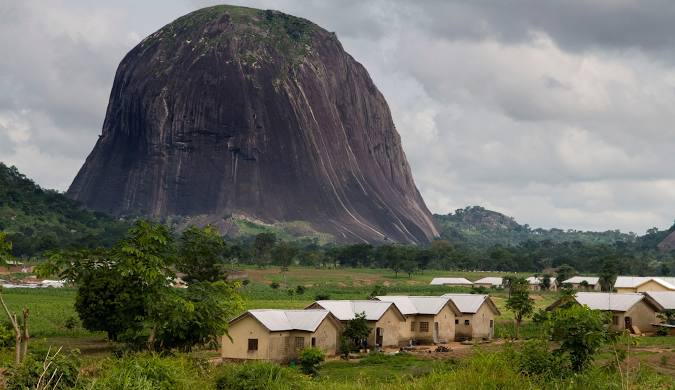Zuma Rock, Nigeria
🏞️ Zuma Rock: The Majestic Gateway to Abuja
Zuma Rock is a natural wonder located just outside Abuja, Nigeria’s capital city. This massive monolithic rock formation, often referred to as the "Gateway to Abuja," stands tall and proud at 800 meters above sea level, offering breathtaking views of the surrounding landscape. Zuma Rock is not just a geological marvel but also holds great cultural and historical significance.
🌍 Why Visit Zuma Rock?
1. Impressive Geological Wonder
-
Zuma Rock is one of Nigeria’s largest and most stunning monolithic rock formations. Its towering presence makes it a popular attraction for nature lovers and adventurers.
-
The rock's unique shape and height make it a fascinating subject for photography, especially with the stunning backdrop of the Nigerian landscape.
2. Cultural and Spiritual Significance
-
Zuma Rock is sacred to the local Gwari people (also known as Gbagyi) who have lived around the area for centuries. It is believed to have spiritual and historical significance, and it is often revered in local folklore.
-
The rock has been associated with spiritual rituals, and the Gwari people regard it as a symbol of strength and protection.
3. Stunning Panoramic Views
-
The summit of Zuma Rock provides panoramic views of Abuja and the surrounding countryside, making it a perfect spot for hiking and photography.
-
The vistas from the top are especially beautiful at sunrise and sunset, offering soft, golden light perfect for nature photography.
🏞️ Things to Do at Zuma Rock
Hiking Zuma Rock
-
Hiking to the Summit: Adventurous travelers can hike up the rock to enjoy a rewarding view from the top. The journey to the summit is a moderate hike that’s suitable for nature lovers and outdoor enthusiasts.
-
Scenic Photography: The rock offers incredible opportunities for photographers, especially those interested in capturing both nature and urban landscapes. The view of Abuja from the top is one of the best in the region.
Cultural Exploration
-
Learn about the Gwari people, who live around the rock and have legends tied to it. Local guides can share fascinating stories and folklore about the rock’s significance.
-
Explore the ancient caves that dot the area, which are said to have been used by early inhabitants of the region for shelter and spiritual practices.
Picnics and Family Outings
-
The base of Zuma Rock is a great spot for a relaxing day out. You can enjoy a picnic while taking in the scenery, especially if you’re traveling with family or friends.
-
The area around Zuma Rock is peaceful, offering a serene environment perfect for a getaway from the hustle and bustle of the city.
🏨 Where to Stay Near Zuma Rock
-
Transcorp Hilton Abuja: Located a short distance from Zuma Rock, this luxury hotel offers modern amenities and is perfect for travelers seeking comfort and convenience.
-
Zuma Rock Lodge: A nearby accommodation that offers a more rustic experience, providing close access to the rock and the surrounding area.
-
Sheraton Abuja: Another well-known hotel in Abuja, offering excellent services and easy access to Zuma Rock and other attractions in the city.
📅 Best Time to Visit
-
Dry Season (November–March): The best time to visit Zuma Rock is during the dry season when the weather is clearer, and hiking is more comfortable.
-
Rainy Season (April–October): The rainy season can make the hike more challenging and less enjoyable, but the lush surroundings make for beautiful scenery.
📸 Photography Tips
-
Golden Hour: Visit during the early morning or late afternoon for the best lighting, where the rock and surrounding landscape are bathed in golden light.
-
Wide-Angle Shots: Capture the vastness of the rock and the panoramic views from the summit with wide-angle lenses for a more dramatic effect.
-
Aerial Views: If you have access to a drone, capturing aerial shots of Zuma Rock and the surrounding area can provide a unique perspective.


